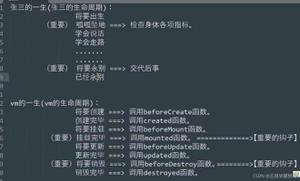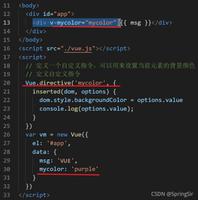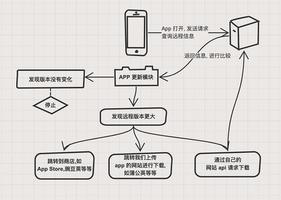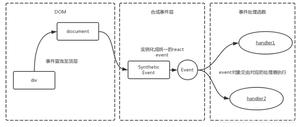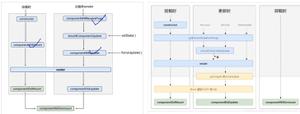详解React生命周期及钩子函数

父组件
import React , {Component} from 'react'import Son from './Son'
class Father extends Component {
constructor(props){
// 可以绑定this 设置props 根据属性设置状态 给方法绑定this
super(props)
console.log('Father : constructor')
this.state = {
color : 'blue'
}
}
componentWillMount(){
// 修改state 不会触发update 可以做初始数据的获取
console.log('Father : componentWillMount')
// this.state = {
// color : 'blue'
// } // color值被改变 但是会报错,建议用setState
}
render(){
// 父组件在render过程中会触发子组件的初始化阶段,当所有的组件都转载完成后,父组件才会执行didmount
console.log('Father : render')
return (
<div>
<button className='Btn' style = {{color:this.state.color}}
onClick = {()=> this.changeColor('red')}
>变成红色</button>
<button onClick = {()=> this.changeColor('yellow')}>变成黄色</button>
{this.state.color !== 'yellow' && <Son color={this.state.color}/> }
</div>
)
}
changeColor(color){
this.setState({color})
}
componentDidMount(){
// 可以操作真实的DOM 初始化结束
console.log('Father : componentDidMount',document.querySelector('.Btn'))
}
// 当组件componentDidMount之后,就进入运行中阶段,此时只要数据(props,state)变化就会触发对应的生命周期钩子" title="生命周期钩子">生命周期钩子函数
shouldComponentUpdate(){
console.log("Father:shouldComponentUpdate");
console.log('Father:',arguments)
return true;
}
componentWillUpdate(){
console.log("Father:componentWillUpdate")
console.log('Father',arguments)
}
componentDidUpdate(){
console.log('Father:componentDidUpdate')
console.log('Father',arguments)
}
}
export default Father
子组件
import React , {Component} from 'react'class Son extends Component {
constructor(props){
super(props)
this.state = {
style:{
width:'200px',
height:'200px',
backgroundColor:this.props.color
}
}
console.log('Children : constructor');
}
componentWillMount(){
console.log('Children : componentWillMount')
}
render(){
console.log('Childern : render')
return (
<div style={this.state.style}>
</div>
)
}
componentDidMount(){
console.log('Children : componentDidMount ')
}
// 当组件componentDidMount之后,就进入运行中阶段,此时只要数据(props,state)变化就会触发对应的生命周期钩子函数
// componentWillReceiveProps->shouldComponentUpdate->componentWillUpdate->render->componentDidUpdate
componentWillReceiveProps(props){
// 这个钩子函数中,新的属性还没挂载到this上,参数props是最新的props
console.log('Children : componentWillReceiveProps',arguments)
this.setState((prevState,props)=>{
console.log(prevState,props,'this.setState函数写法中接收的参数') // props 是最新的props
let newstyle = { ...prevState.style }
newstyle.backgroundColor = props.color
return {style:newstyle}
})
}
// 当属性或者状态变化后都会执行,需要返回true和false,默认返回true,控制是否执行下面的钩子函数(是否重新渲染)
shouldComponentUpdate(props, state){
// 此时,最新的属性和最新的状态依然没有挂载到this上,需要从函数中接收
console.log('Children:shouldComponentUpdate',arguments);
return true;
}
componentWillUpdate(props, state){
// 此时,最新的属性和最新的状态依然没有挂载到this上,需要从函数中接收 没什么作用
console.log('Children:componentWillUpdate',arguments)
}
componentDidUpdate (prevprops, prevstate) {
// 在这里可以得到重新渲染后的dom
if ( prevprops.color !== this.props.color ) {
// 此次组件rerender是因为color变化
}
console.log('Children:componentDidUpdate')
}
componentWillUnmount () {
// 当组件被销毁的时候会执行这个钩子函数
console.log('Children:componentWillUnmount')
}
}
export default Son
初始渲染
注意:父组件在render过程中会触发子组件的初始化阶段,当所有的子组件都装载(compoentDidMount)完成后,父组件才会执行自己的componentDidMount
点击变成红色按钮后
当组件componentDidMount之后,就进入运行中阶段,此时只要数据(props,state)变化就会触发对应的生命周期钩子函数。
会依次执行 componentWillReceiveProps->shouldComponentUpdate(scu)->componentWillUpdate->rende->componentDidUpdate
点击变成黄色按钮后 销毁子组件
当组件销毁后会执行组件的 componentWillMount 这个钩子函数。
注意在React中组件销毁的时候连带dom一起消失的,所以没有销毁后的钩子
以上是 详解React生命周期及钩子函数 的全部内容, 来源链接: utcz.com/z/381137.html

